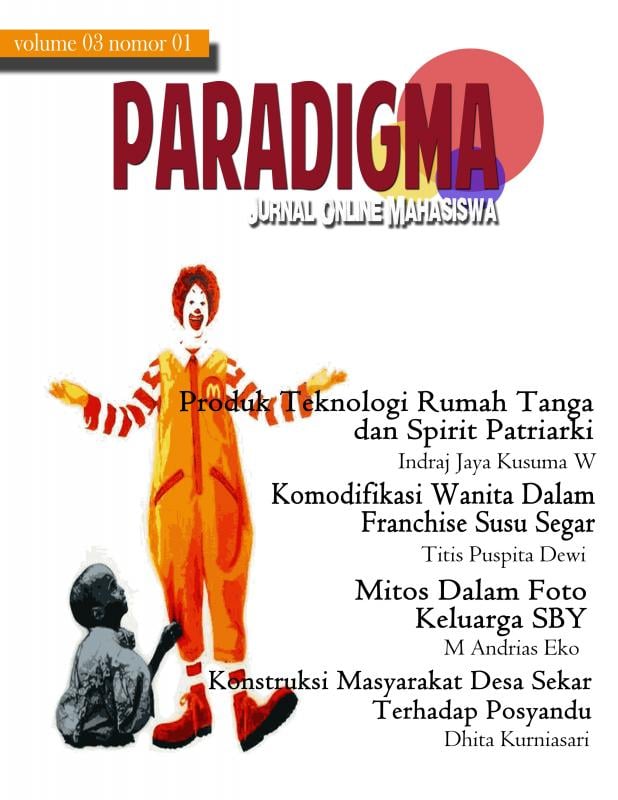Konstruksi Masyarkat Desa Sekar Terhadap Posyandu Sebagai Unit Pelayanan Kesehatan
Abstract
Abstrak
Pembangunan bidang kesehatan mempunyai arti yang sangat penting dalam kehidupan. Khususnya dalam memelihara dan meningkatkan kesehatan masyarakat. Salah satu upaya WHO dalam rangka meningkatkan dan memelihara kualitas kesehatan yaitu melalui MDGs (Millenium Development Goals). Negara-negara berkembang seperti Indonesia berkewajiban melaksanakannya, sementara negara-negara maju berkewajiban mendukung dan membantu negara berkembang dalam upaya mencapai tujuan MDGs. Fokus pemerintah untuk memenuhi target MDGs dalam bidang ini ialah dengan menekan angka kematian ibu (AKI) dan Bayi (AKB). Derajat kesehatan anak dapat ditinjaui melalui Angka kematian Bayi (AKB) pada saat bayi dilahirkan. AKB merupakan indikator untuk menjelaska keadaan tingkat kesehatan di suatu masyarakat. Pada penelitian ini bertujuan untuk melihat konstruksi masyarakat desa Sekar terhadap posyandu sebagai unit pelayan kesehatan bahwa individu di dalam lingkungan masyarakat akan memilih, menimbang, dan kemudian menentukan hal-hal yang akan memuaskan kebutuhannya. Peneliti menggunakan teori konstrruksi sosial Berger dan Luckmann melalui proses eksternalisasi, objektivasi, dan internalisasi untuk melihat konstruksi masyarakat dalam pelayanan Posyandu. Peneleitian ini bersifat penelitian kualitatif deskriptif dan menggunakan fenomenologi Husserl. Tempat penelitian yaitu Desa Sekar Kecamatan Sekar Kabupaten Bojonegoro. Menggunakan teknik analisis deskriptif pada Miles & Huberman dan mengacu pada teori konstruksi sosial Berger dan Luckmann. Hasil penelitian bahwa partisipasi masyarakat masih rendah. Hal tersebut disebabkan oleh faktor lingkungan sosial, pendidikan, dan perekonomian. Informan sebagai korban AKB cenderung tidak memperhatikan kondisi kesehatan terutama pada saat kehamilan. Mereka lebih mementingkan untuk bekerja daripada membawa anak untuk pergi ke Posyandu.
Kata Kunci: Angka kematian bayi, Posyandu, dan Konstruksi Masyarakat
ABSTRACT
Development of the health sector has a very important in life. Especially in maintaining and improving the public health. One of the efforts WHO in order to mantaining and improving the quality of life is through MDGs (Millennium Development Goals). Developing countries like Indonesia have the obligation to perform on, while developed countries have the obligation to support and help developing countries in an attempt at achieving the purpose of the MDGs. The focus of the government to meet the target of the MDGs in this area was to reduce the maternal mortality (MMR) and babies (IMR). The health of the children get through the infant mortality rate (IMR) at the time of babies being born. IMR is an indicator to explain the state of the soundness of in a society. In this research will see social construction Sekar society to Posyandu as a unit of health care that individuals in the community will choose, weigh, and then determine something that will satisfy their needs. Researchers used the theory of social construction Berger and Luckmann through the process of externalization, objectivation, and internalization to see the social construction in Posyandu. This research is descriptive and qualitative research using the phenomenology of Husserl. The place is the village Sekar District of Bojonegoro.
Using descriptive analysis techniques at Miles & Huberman and refers to the social construction theory Berger and Luckmann. The results of the study that public participation is still low. It is caused by environmental factors of social, educational, and economic. Informants as victims tend not to pay attention IMR health conditions especially during pregnancy. They are more concerned to work rather than take a child to go to the Posyandu.
Keywords: IMR, Posyandu, Social Construction
Downloads
Downloads
Published
How to Cite
Issue
Section
 Abstract views: 45
,
Abstract views: 45
, PDF Downloads: 40
PDF Downloads: 40


